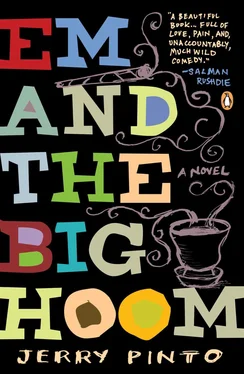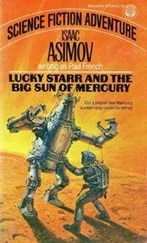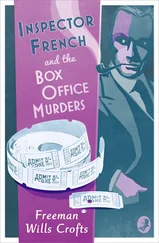Jerry Pinto - Em and the Big Hoom
Здесь есть возможность читать онлайн «Jerry Pinto - Em and the Big Hoom» весь текст электронной книги совершенно бесплатно (целиком полную версию без сокращений). В некоторых случаях можно слушать аудио, скачать через торрент в формате fb2 и присутствует краткое содержание. Год выпуска: 2014, Издательство: Penguin Books, Жанр: Современная проза, на английском языке. Описание произведения, (предисловие) а так же отзывы посетителей доступны на портале библиотеки ЛибКат.
- Название:Em and the Big Hoom
- Автор:
- Издательство:Penguin Books
- Жанр:
- Год:2014
- ISBN:нет данных
- Рейтинг книги:3 / 5. Голосов: 1
-
Избранное:Добавить в избранное
- Отзывы:
-
Ваша оценка:
- 60
- 1
- 2
- 3
- 4
- 5
Em and the Big Hoom: краткое содержание, описание и аннотация
Предлагаем к чтению аннотацию, описание, краткое содержание или предисловие (зависит от того, что написал сам автор книги «Em and the Big Hoom»). Если вы не нашли необходимую информацию о книге — напишите в комментариях, мы постараемся отыскать её.
Em and the Big Hoom — читать онлайн бесплатно полную книгу (весь текст) целиком
Ниже представлен текст книги, разбитый по страницам. Система сохранения места последней прочитанной страницы, позволяет с удобством читать онлайн бесплатно книгу «Em and the Big Hoom», без необходимости каждый раз заново искать на чём Вы остановились. Поставьте закладку, и сможете в любой момент перейти на страницу, на которой закончили чтение.
Интервал:
Закладка:
Between each phase of the cycle, we were vouchsafed a period of normal time. This could last for a few days.
‘Or a few weeks,’ Susan reminds me.
‘When did it ever last a few weeks?’
‘The dawn of Lithosun,’ she says.
• • •
Lithosun. How could I have forgotten? Just when the pharmacopeia seemed fixed, lithium carbonate came into our lives. Li2CO3. At first, The Big Hoom seemed sceptical, but since close monitoring was worked into the care, he agreed and the first prescriptions were written.
Lithium was indeed the miracle drug. For two years, Em did not suffer the terrors of twitching depression, nor were her manic states stratospheric. This did not make her an ordinary mother. She still refused to have anything to do with the kitchen. She still thought baths were a necessary evil and tried, like the boys of hundreds of American cartoons, to avoid them. She still laughed immoderately and wondered aloud whether there would be news in the paper about trees because there was a white light shining out of the subabul outside our balcony. But we could all live with this and we settled down happily and humdrummily. We could taste our happiness.
Every month Susan or I would take her for a blood test because lithium carbonate was a poison and could not be allowed to accumulate in her body. Like so many medical tests, this one had to be conducted on an empty stomach. So, early in the morning, armed with a flask of tea and some sandwiches, we would set out for Breach Candy Hospital.
What was it about hospitals that made Em so calm? She was always civil to the doctors and nurses and only once in every while would the mania flash out. In the depressive phase, she was terribly, horribly polite, often begging for forgiveness from total strangers and, more often than not, receiving puzzled benisons.
But during the Lithosun period, she was always ready for a little chat. She would try to draw other patients out, specially the quiet women in the waiting rooms.
‘What’s wrong with her?’ she would ask the husband if the wife could not be teased out of her cocoon of stubborn silence.
‘Nerves,’ the husband would reply briefly.
‘Come home and give her a hug,’ my mother would say. ‘Take her to the pictures and hold her hand.’
Most of the time, the men took these comments in their stride. Some smiled condescendingly, some looked discomfited but said nothing. Those who suffer from mental illness and those who suffer from the mental illness of someone they love grow accustomed to such invasions of their privacy. Does that make things easier? For everyone? I’m still not sure. I used to wonder: what must it mean for a lower middle-class woman to tell a stranger about her sexual history and her fantasy life? Does she understand the free association that is sometimes used, or why the psychiatric social worker wants to know so much about her childhood? Those who have some experience with homoeopathy may not be shaken or shamed by the bizarreness of the questions, but which Indian woman will talk about masturbation? And what can mental health mean in a nation that wants an injection to put it back on its feet the next morning?
By day, the Breach Candy Hospital catered to the affluent. In the early morning, the place was different. That was the time a wide range of patients turned up, from those who needed their toxins monitored to young men taking a second physical examination in the hope that the results of the first would be invalidated — or at least declared an aberration. Em loved the unexpectedness of the hospital.
‘What are you waiting for?’ she once asked a morose young man who was thumbing through a thin file.
‘I want to go to NDA, aunty.’
‘So why aren’t you going?’ she asked him.
‘They are saying I have albumen in my urine.’
‘Is that like egg white?’
‘I don’t know, aunty. But they are not allowing.’
‘Have you prayed?’ Em asked. This seemed unnecessary since he was well anointed with sandalwood paste and turmeric and there were a few grains of rice still sticking to the red oxide of iron on his forehead.
‘Yes aunty. I have promised to write God’s name one lakh times if I get into NDA.’
‘What is this NDA?’
The young man looked startled. ‘Aunty! You don’t know? It’s National Defence Academy.’
‘Oh.’ Em was not sure she approved but she rallied. ‘I will pray that you get to do what is right for you.’
‘What about you, aunty?’
‘I had a nervous breakdown and tried…’
I began to hiss a little at such promiscuous revelation.
‘Don’t mind my son. He’s shy. I tried to kill myself so I have to take pills and they have to examine my blood.’
‘You are mental, aunty?’
I bristled but my mother didn’t seem to mind.
‘Yes, yes.’
‘Oh good. My Buaji says God listens to the prayers of mentals because they are touched by His hand.’
‘How nice. You hear that, baba? I was touched by the hand of God. And I have a hotline to Him, according to this young man’s someone or the other. I will pray right now.’
‘Only…’
The young man hesitated. He seemed to be assessing us. Then he took the plunge.
‘My Buaji is Muslim.’
‘And I am Christian. And you are Hindu. So?’
‘Means…’
‘He’s wondering whom you will pray to,’ I said to Em. She looked at me. Then at him.
‘I will pray to your Buaji’s God, then. I’ll pray to Allah,’ she said.
Did she? I would have prayed to any god, any god at all, if I could have been handed a miracle, a whole mother, a complete family, and with it, the ability to turn and look away.
• • •
I lost my faith as an hourglass loses sand. There was no breaking moment but one day I found myself reading the Gospel without a twinge. I had always hated the Gospels because they had unhappy endings, all four of them. They seemed rushed stories. He’s born. He grows up. He preaches. He cures. He saves. All this is in the course of a few chapters. And then that Thursday and Friday, the horror of his foreknowledge, the last desperate plea to be permitted to elude this ordeal, the abandonment by friends who cannot keep vigil with him, the humiliation of his nakedness, the pain of the scourgings and the crown of thorns, the mocking crowds, the crying women, the cross, the crucifixion and even the last request — ‘I thirst’ — denied. I had always felt genuine distress at all this. I could not bear to read it, could not bear to put it down. It was the pain of empathy, the sorrow that this should happen to anyone.
That pain vanished one day. I read the passion through to check myself again. I read another version by another evangelist and was left unmoved. I remember being vaguely relieved and slightly guilty. I did not even realize at that moment that I had lost my faith. What I had left was a syrupy sentimentality and an aesthetic appreciation of the Gregorian chant, the form of the fasting Buddha, and a love of stories. This is the standard equipment of the neo-atheist: eager to allow other people to believe, unwilling to proselytize to his own world which seems bleaker without God but easier to accept.
No one could offer any explanation for the suffering I watched my mother go through. Nothing I read or heard fitted with the notion of a compassionate God, and God’s compassion, one uncomplicated, unequivocal miracle of kindness, was the only thing that could have helped. The sophisticated arguments of all the wise men of faith — their talk about the sins of a past life, the attachment to desire, the lack of perfect submission — only convinced me that there was something capricious about God. How could one demand perfect submission from those who are imperfect? How could one create desire and then expect everyone to pull the plug on it? And if God were capricious, then God was imperfect. If God were imperfect, God was not God.
Читать дальшеИнтервал:
Закладка:
Похожие книги на «Em and the Big Hoom»
Представляем Вашему вниманию похожие книги на «Em and the Big Hoom» списком для выбора. Мы отобрали схожую по названию и смыслу литературу в надежде предоставить читателям больше вариантов отыскать новые, интересные, ещё непрочитанные произведения.
Обсуждение, отзывы о книге «Em and the Big Hoom» и просто собственные мнения читателей. Оставьте ваши комментарии, напишите, что Вы думаете о произведении, его смысле или главных героях. Укажите что конкретно понравилось, а что нет, и почему Вы так считаете.











